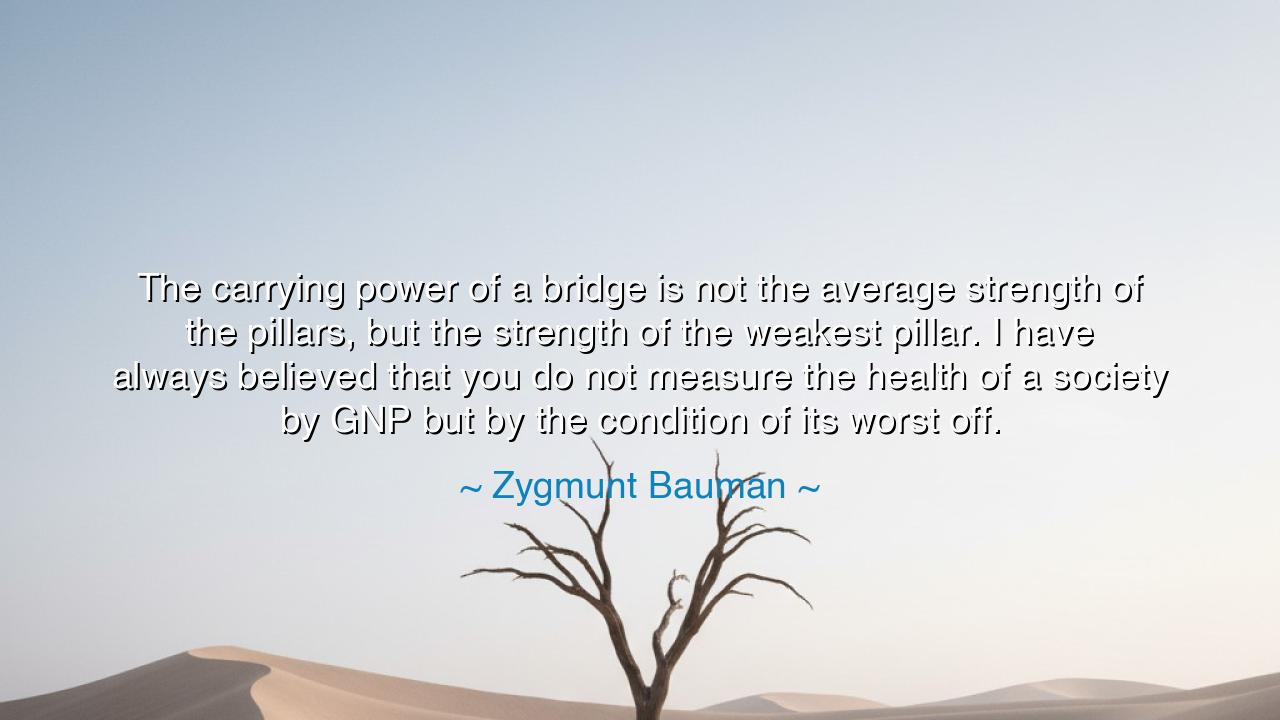
The carrying power of a bridge is not the average strength of the
The carrying power of a bridge is not the average strength of the pillars, but the strength of the weakest pillar. I have always believed that you do not measure the health of a society by GNP but by the condition of its worst off.






Zygmunt Bauman, the philosopher of liquid modernity, once declared: “The carrying power of a bridge is not the average strength of the pillars, but the strength of the weakest pillar. I have always believed that you do not measure the health of a society by GNP but by the condition of its worst off.” These words shine like a torch in the dark, illuminating a truth that has too often been forgotten: that the greatness of a people is not to be found in its wealth, its monuments, or its numbers, but in the care it offers to those who stumble, to those who cannot stand on their own.
The meaning is drawn from the wisdom of both nature and engineering. A bridge does not collapse because its strongest pillars stand tall; it collapses when a single pillar crumbles. Likewise, a society is not judged by the prosperity of its elites or the brilliance of its innovators alone, but by the suffering of those at the margins—the hungry child, the abandoned elder, the silenced worker. Bauman’s metaphor pierces the illusion of averages, reminding us that no community is stronger than its weakest members.
History confirms this truth with sobering clarity. Consider the fall of the Roman Empire. At its height, Rome’s wealth and splendor dazzled the world. The rulers measured greatness by conquest and treasure. Yet beneath the marble and gold, inequality festered: slaves were countless, peasants crushed by debt, and provinces exploited. The pillars of Rome’s society were not balanced, and when the weakest broke under strain, the empire itself collapsed. Rome’s tragedy is Bauman’s warning—that the neglect of the vulnerable imperils the whole.
Another example is found in the 20th century with the rebuilding of Europe after World War II. In the ruins, leaders could have focused only on production and GNP, but instead they laid foundations of solidarity—healthcare for all, education for all, protections for workers. They understood that the health of society lay not in its richest but in its poorest, and that no bridge to the future could stand if some were left to drown. The prosperity that followed was not an accident; it was the fruit of tending to the weakest pillars first.
Bauman’s words are not only descriptive but moral. To measure society by GNP is to treat human beings as numbers in a ledger, to glorify averages that conceal suffering. But to measure by the condition of the worst off is to look honestly at human dignity. It is to ask: can the widow live with honor? Can the orphan eat? Can the laborer rest without fear of starvation? If the answer is no, then the society, no matter its wealth, is unwell.
The lesson for us is urgent: do not be deceived by statistics that proclaim prosperity while neighbors go hungry. Look always to the edges, for it is there that the truth of a people is revealed. If the weak are protected, if the vulnerable are uplifted, then the whole community stands firm. If they are neglected, then even the mightiest economy will crumble like a bridge whose weakest pillar fails.
Practical action lies within our reach. Support policies and institutions that protect the poor, the sick, the elderly, the marginalized. In daily life, refuse to measure success by possessions or status; instead, measure it by compassion, by solidarity, by the extent to which you strengthen those around you. Teach children that greatness is not domination, but service. And in your own heart, remember always that your strength is bound to the strength of the weakest among you.
So let Bauman’s words resound across generations: “The strength of a society is the strength of its weakest pillar.” Live by this truth, and you will help to build bridges that do not collapse under the weight of time, but carry generations safely across the storms of history, upheld by justice, compassion, and unbreakable solidarity.






AAdministratorAdministrator
Welcome, honored guests. Please leave a comment, we will respond soon